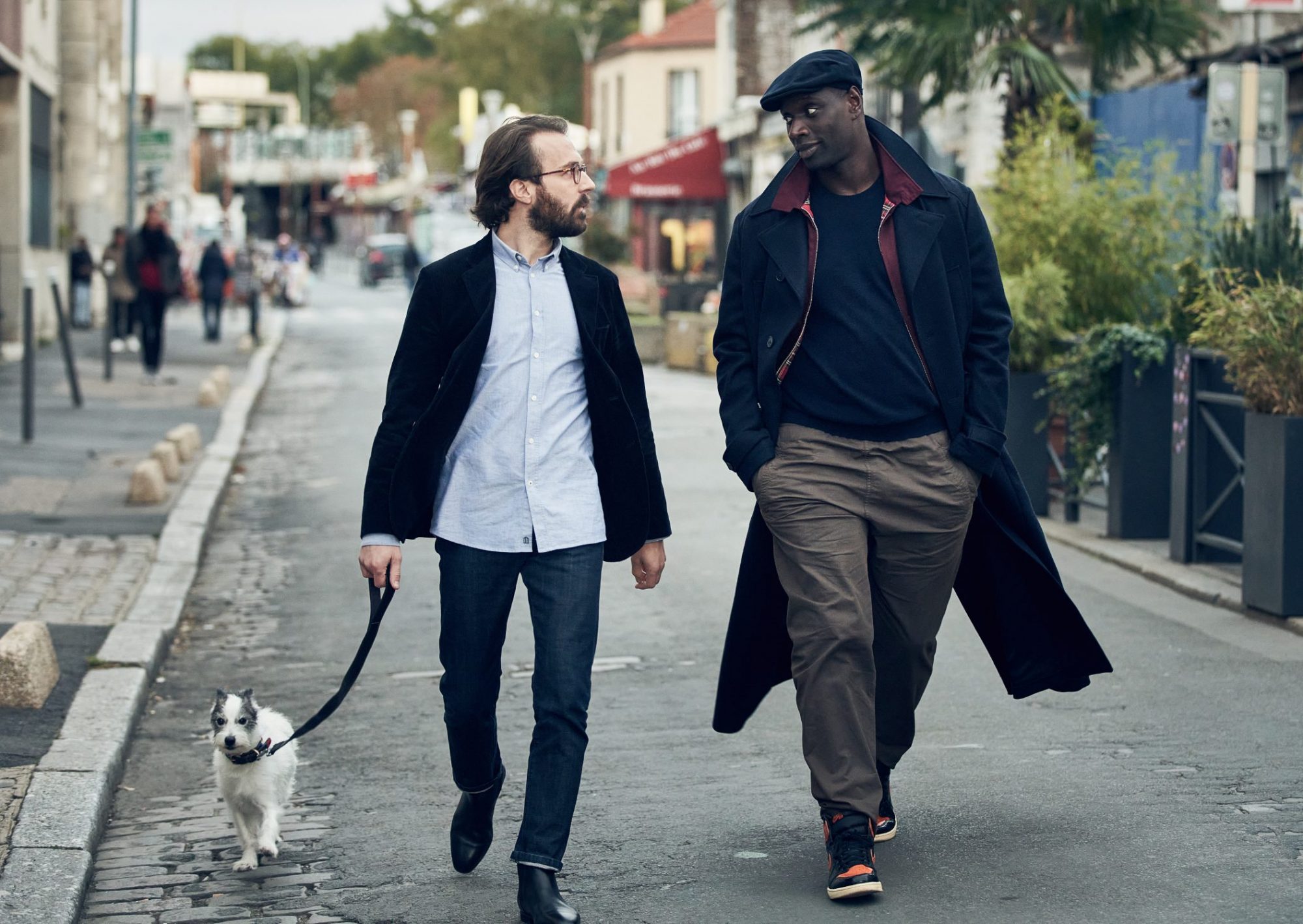In January, when Netflix launched its wildly popular French TV series Lupin, its star Omar Sy went into the Metro station under the Louvre in Paris. In the show, Sy plays a thief who takes a job as a night cleaner at the museum in order to plot a spectacular heist under the noses of white curators who are barely aware of a Black janitor.
In the Metro, in real life, Sy began pasting a giant poster advertising the show on a billboard space on the platform. Incredibly, the commuters took no notice of one of France’s biggest movie stars. Sy even asked one person for assistance, yet still no one recognized him. Sy says the experience, about which he posted on his Instagram feed, was illuminating. “There is a category of person in France, people who have specific jobs, but who we never stop to consider,” Sy (pronounced See) tells TIME in a Zoom interview in May while relaxing in a hotel in Grenoble, France. “People will just pass by you without seeing you,” he says. “What we say in the series is not an invention. It is what is happening in real life.”
Ironically, Sy’s experiment with being unseen came just as Lupin gave him visibility to a new, more international audience. Netflix says about 76 million subscribers viewed the first five episodes that launched in January; it counts views as those who watch at least two minutes. The next five episodes are available from June 11. The company’s co-CEO Ted Sarandos told investors in January that Lupin had ushered in “a really incredible evolution,” in which viewers (notably Americans) who have long shunned subtitled content were binge-watching the show. “They push play, and 10 minutes later, all of a sudden they like foreign-language television,” he said.

‘Our idea of an ideal French person’
Sy, 43, plays Assane Diop, the orphaned son of a Senegalese immigrant who becomes obsessed with Arsène Lupin, the “gentleman thief: depicted in Maurice Leblanc’s classic stories of French literature written in the 1900s, who wows his victims with elegance and charm, even as he robs them blind. Using Lupin’s tactics, Assane sets out to avenge an act of savage cruelty against his late father.
The show’s intricate plots and twisty narrative offers rollicking entertainment, but it is Sy’s magnetism that keeps you watching. Assane, a Black man who deftly navigates a world of white privilege all while wearing his heart on his sleeve, is a radical update from the original characterization of Lupin over a century ago. “We tried to depict our idea of an ideal French person in the France we see now,” Sy says.
Appearing in the midst of pandemic lockdowns and a push for racial equity, Assane is a new breed of hero to match the current moment. “To have Omar represent humanity this year, it just made sense to people,” says the filmmaker Louis Leterrier, who directed the first three episodes, and is a close friend of Sy. “Whether you’re Black, Asian or Caucasian, people saw him and said, ‘That’s who I want to root for,’” he says.
Read more: The Best Result of the Streaming Boom? America Finally Loves Foreign-Language TV
Like his character in Lupin, Sy came from humble beginnings. He was raised in a housing project in the underprivileged exurb of Trappes, 20 miles west of Paris, one of seven children. His Senegalese father worked in an auto factory and his Mauritanian mother was a building cleaner. Sy was drawn to acting in order “to transcend a form of shyness,” he says.
He launched his career with comedy sketches on radio, but became a national star during the 2000s, as one half of a comic duo, Omar et Fred, that did nightly two-minute acts on France’s Canal Plus TV. It was in 2011 that his fame exploded domestically with the movie Intouchables, in which he plays an ex-con from a poor, majority Black banlieue—much like his real hometown—who lands a job tending to a spectacularly wealthy, white quadriplegic in Paris’ glittering center. While some American critics questioned its treatment of Black characters (Variety accused it of “Uncle Tom racism”), French audiences lapped it up. The movie remains France’s biggest-ever global hit, grossing more than $426 million worldwide, and Sy became the first Black male artist ever to win the Best Actor César, France’s equivalent to the Academy Award. In 2019, Hollywood released a U.S. remake called The Upside, with Kevin Hart and Bryan Cranston.
In the wake of the original movie’s success, Sy moved with his Parisian wife and four kids to Los Angeles, where he now lives; their fifth child was born there. Roles followed in Hollywood blockbusters X-Men: Days of Future Past, Jurassic World and Inferno. Sy says he took his family to California initially for a “gap year,” before settling in and perfecting his English, effectively forging a U.S. career. That has happened while Black actors in France have protested the white dominance of their country’s movie industry. Sy jokes that he tries hard to keep French culture alive at home, among his increasingly American children, just as his own father tried to instill his Senegalese culture to his children. “We are very happy in Los Angeles,” he says. “I see my children blossoming. That is all one wishes as a parent.”

Drawing strength from obstacles
For all his happiness and success, the theme of Lupin remains deeply familiar to Sy from his own life experience—the schism between wealth and poverty, and its close overlap in France with race. “There are two Frances that exist side by side,” Sy told me back in 2012, after Intouchables came out. Growing up in a Black immigrant family, he was shut out of white, rich France. “We always knew it existed, but we didn’t ever see it,” he said then.
Today he lives in a different world from many of the people he grew up with, a fact that he says spurs “sometimes guilt, of having succeeded while others have not. There is still that question of, What can I do to change it?” He is an ambassador for his wife Hélène’s foundation, which helps hospitalized children in France, but he hesitates to become a celebrity activist. “It works best if we don’t raise our voice every five seconds,” he says.
Standing on the sidelines was no longer a possibility in 2020. In the midst of what Sy calls “a sad summer,” he joined a Black Lives Matter protest in L.A., and wrote an appeal in the French magazine L’Obs calling for France to investigate the 2016 death in police custody of Adama Traoré, a Black Parisian. “Wake up,” he wrote. “Let’s have the courage to denounce police violence in France. Let’s act to fix it.”
Events pushed him to speak out, he says. “I told myself this was a particular moment, and therefore I had to do something particular.” But he grappled with the decision before making it, he says. “My main instinct is to stay out of all this. We say so many things with the work we do, with films we choose, and the characters we embody.”
To Sy, his character in Lupin carries a message that has resonance today. In the stories on which the show is based, he notes, Arsène Lupin practiced the ancient martial art of aikido. “The whole point of aikido is to use the strength of the adversary, and turn it around to our advantage,” Sy says. Similarly in the show, Assane learns to turn his liabilities into strengths as he plots revenge. “So this thing that is against us can be turned around.”
—With reporting by Madeline Roache/London
More Must-Reads from TIME
- Caitlin Clark Is TIME's 2024 Athlete of the Year
- Where Trump 2.0 Will Differ From 1.0
- Is Intermittent Fasting Good or Bad for You?
- The 100 Must-Read Books of 2024
- Column: If Optimism Feels Ridiculous Now, Try Hope
- The Future of Climate Action Is Trade Policy
- FX’s Say Nothing Is the Must-Watch Political Thriller of 2024
- Merle Bombardieri Is Helping People Make the Baby Decision
Contact us at letters@time.com